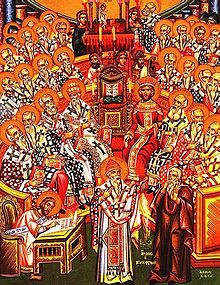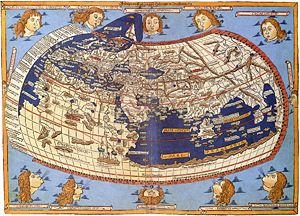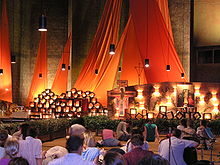- Ecumene
-
For oikoumene.org, see World Council of Churches.
Ecumene (also spelled œcumene or oikoumene) is a term originally used in the Greco-Roman world to refer to the inhabited universe (or at least the known part of it). The term derives from the Greek οἰκουμένη (oikouménē, the feminine present middle participle of the verb οἰκέω, oikéō, "to inhabit"), short for οἰκουμένη γῆ "inhabited world".[1] In modern connotations it refers either to the projection of a united Christian Church or to world civilizations.
Contents
Ancient world
Eratosthenes of Cyrene (276-196 BC) deduced the circumference of the earth with remarkable accuracy. In his Geographia, Claudius Ptolemy (83 – 161 AD), refining existing knowledge of his day, provided a description of the known lands, and a calculation of the remainder of the Earth's surface. His Oecumene spanned 180 degrees of longitude from the so-called Blessed Islands (Μακάρων Νήσοι, probably the Cape Verde islands) in the Atlantic Ocean to the middle of China, and about 80 degrees of latitude from Shetland to anti-Meroe (east coast of Africa); Ptolemy was well aware that he knew about only a quarter of the globe, and an erroneous extension of China southward blocked off any awareness of the Pacific Ocean. Ptolemy knew that the oecumene, as then known, would not quite cover one-fourth of the calculated area of the globe. Having a love of symmetry, then, he predicted three additional continents along with the oecumene: Perioeci (lit. "same latitude, other side"), Antoeci (opposite the Perioeci) and Antipodes (lit., “opposite the feet”). The Greek cartographer Crates summed it all up on a globe created in about 150 BC.[2]
Byzantine usage
 First Ecumenical Council, 325.
First Ecumenical Council, 325.
Over time, the word came to mean the civilized world, and to be synonymous with the Roman Empire. This usage continued after the division of the Empire into East and West, and the Byzantine Emperors would use the term to describe their imperial administration. Constantinople itself came to be known as the "Ecumenical City". The word was adopted within Christianity, especially for Synods called by the Emperors and composed of bishops throughout the world (see Ecumenical Councils).
In the year 586, the Emperor Maurice bestowed the title of Ecumenical Patriarch on the Patriarch of Constantinople. The intended meaning was that the Patriarch of Constantinople was the bishop of the imperial capital.[3] Due to a mistranslation from the Greek into Latin, this led to a conflict between the patriarch at the time, St. John the Faster, and St. Gregory the Great over the use of the term. Gregory misunderstood the title as implying a universal jurisdiction and authority for the Patriarch of Constantinople.[4] In Gregory's Epistle V:xviii he reproves Patriarch John for having "attempted to seize upon a new name, whereby the hearts of all your brethren might have come to take offence," not knowing that John had not desired the title, and not understanding its intent. The Patriarch of Constantinople still bears this title to this day.
Modern usage
Religion
Ecumenical worship service at the monastery of Taizé.
In the twentieth century, the term has been employed to refer to Ecumenism, the promotion of unity or cooperation between distinct religious groups within Christianity. Within this context, it has been suggested there exists (or shall exist in the future) a single believing community amongst the various different Christian groups. This definition—and its presuppositions—is not accepted by every Christian group. The work of ecumenism takes place in the form of negotiations conducted between committees of various denominations and also through the deliberations of inter-denominational organizations such as the World Council of Churches. Relevant issues include Baptism, the Eucharist and Ministry.
Cultural history
In the context of cultural history, the term was first used in an academic sense by Lewis Mumford in his work, Technics and Civilization (1934)[5] and later popularised by William McNeill. In its modern cultural historic use, the term was popularised in McNeill's "Rise of the West" where he suggested that a single global oecumene was created through the dominance of European political institutions, science, technology, and economic forms, from the late 18th century onwards. One could argue that prior to the great voyages of discovery, initiated by Christopher Columbus, Vasco da Gama and Ferdinand Magellan, there were originally two separate world oecumenes - one covering north and east Africa, Eurasia and its surrounding Japanese, Indonesian and European archipelagos, and the other covering Mesoamerica, the South East of the USA, and the Andean region. It was the Spanish Conquistadores that fused this second oecumene within the first to create a single integrated "world system".
Ecumenes in fiction
- The author J. R. R. Tolkien described his Middle-earth setting for his fiction as equivalent to the Greek ecumene, the abode of Men.
- In the Demon Princes series of science fiction novels by Jack Vance, Oikumene is the term used for the human-inhabited worlds of the galaxy.
- In the science fiction novel Time's Eye co-authored by Arthur C. Clarke and Stephen Baxter Oikoumene is a grassroots religious unification movement bridging the divide between Catholicism and Islam.
- In The Left Hand of Darkness and other fiction by Ursula K. Le Guin, the Ekumen is a loose confederation of inhabited worlds, linked by instantaneous communication, but separated by slower-than-light travel.
- In the science fiction trilogy The Golden Age, by John C. Wright, a polity called the Golden Oecumene spans all of the Solar System.
- In the halo universe, more particularly 'Halo:Cryptum', the Forerunner Ecumene spanned the galaxy by 100,000 years ago.
References
- ^ Oxford English Dictionary. The OED, while accepting both the œ- and e- spellings, idiosyncratically prefers œ- for the basic word but e- for its derivatives. Merriam-Webster prefers e-. The unnaturalized oikoumene is nonstandard but sometimes encountered.
- ^ Klein, Samuel John (2005), "Oecumene", Cartography Word of the Day, Designorati, http://designorati.com/articles/t1/cartography/462/cartography-word-of-the-day-oecumene.php, retrieved 2008-01-03
- ^ "The Universal Patriarch", The Witness, XXV, No. 13, August 3/16, 1981, Boston, Massachusetts: Holy Transfiguration Monastery, http://www.homb.org/st_annas/Articles/UniversalPatriarch.pdf, retrieved 2008-01-03
- ^ Schaff, Philip (1882), "Gregory and the Universal Episcopate", History of the Christian Church, IV: Mediaeval Christianity: A.D. 590-1073, Peabody, Massachusetts: Hendrickson Publishers; 3rd edition (July 1, 1996), ISBN 978-1565631960, http://www.ccel.org/ccel/schaff/hcc4.i.iv.iv.html, retrieved 2008-01-03
- ^ Mumford, Lewis (1934), Technics and Civilization, New York: Harcourt, http://history.sandiego.edu/gen/soc/technics.html, retrieved 2008-01-03
External links
- The Apotheosis of Homer showing personification of Oecumene
- Pope Gregory and the Universal Episcopate
Categories:- Ancient Greece
- Greek loanwords
- Christian terms
- Ecclesiology
Wikimedia Foundation. 2010.


